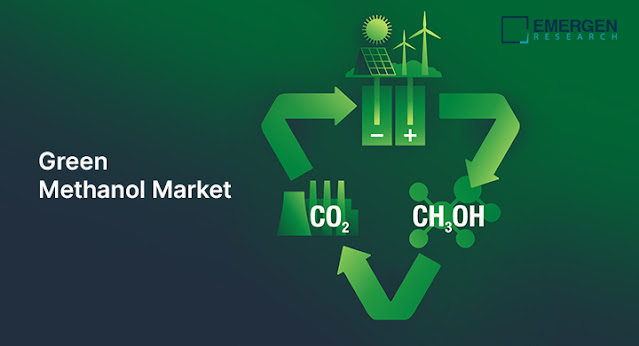Methanol is one of the most widely produced and used
organic chemicals and a crucial raw material for various end-use industries.
However, production of methanol by conventional methods releases robust amounts
of fossil greenhouse gases. Growing focus on creating a carbon-neutral
industrial system has led to the generation of green methanol and is expected
to play a significant role in energy transition. Green
methanol is a low-carbon fuel that can be produced from biomass
gasification or renewable electricity and sequestered carbon dioxide. Green
methanol is eco-friendly and can be used as an energy carrier for storing
electricity generation from renewable sources. Escalation of climate crisis has
created an unprecedented demand for alternative energy fuels and sources.
Increasing affordability of renewable energy has enabled production of methanol
based on wind and solar power, geothermal energy, or hydropower, which can in
turn, significantly reduce greenhouse gas emissions. Green methanol also has
the potential to serve as a fuel for maritime fuel applications and can be
added to conventional liquid fuels or can be used to fuel 100% methanol-based
vehicle systems.
Green methanol production involves biological
pathways, thermo-chemical pathways, or electrofuel pathways such as power to
gas. Green methanol can play a crucial role in decarbonising both energy and
chemical sectors. Use of capture carbon as a feedstock can help reduce the
large carbon footprint of chemical industry. Out of the carbon capture and
utilisation (CCU)-based chemicals of interest, green methanol has garnered a
lot of attention due to its potential role as an energy carrier. Green methanol
can be used as a fuel in trucks and ships or converted to olefins to develop
molecules of interest.
Browse Full Report Description + Research Methodology + Table of Content
+ Infographics@ https://www.emergenresearch.com/industry-report/green-methanol-market
Shipping industry has witnessed tremendous pressure
from regulators and consumers to minimize greenhouse gas emissions. In recent
news, A.P. Moller-Maersk announced it would launch a feeder ship in 2023 that
would be running on green methanol. Maersk’s new vessel will be running solely
on green methanpl; but the ship will also be able to utilize conventional fuels
such as very low sulphur fuel oil and marine gas oil, and even LNG to some
extent.
In March 2022, Maersk and Egyptian authorities signed
a Memorandum of Understanding (MoU) to explore establishment of large-scale
green fuel production in the region to accelerate shift towards zero-emission
targets. In the same month, Chinese automotive company, Geely began testing its
e-methanol vehicles in the Danish port of Aalborg. The two sedans and heavy
truck run on e-methanol that is produced by Power-to-X solution, which is a
sustainable, carbon-neutral, renewable fuel.
Key companies in the Green
methanol market include Advanced Chemical Technologies, BASF SE, Uniper SE,
Fraunhofer GmbH, Enerkem Inc., Innogy SE, Nordic Green ApS, Vertimass LLC,
Saudi Basic Industries Corporation, and Södra Skogsägarna. In April 2022,
Maersk announced a strategic partnership with five companies including
Oiltanking Asia Pacific Pte. Ltd., Kenoil Marine Services Pte Ltd., Air
Liquide, PTT Exploration and Production Public Company Limited, and YTL
PowerSeraya Pte. Limited. For a “Green Methanol Value Chain Collaboration.” Under
the partnership, the six companies will be running feasibility studies by the
end of 2022 to develop a green e-methanol pilot plant having a minimum capacity
of 50,000 tons per annum. The new plant will be working by converting biogenic
carbon dioxide into green e-methanol.
Custom Requirements can be requested for this Report [Customization
Available] @ https://www.emergenresearch.com/request-for-customization/985




No comments:
Post a Comment